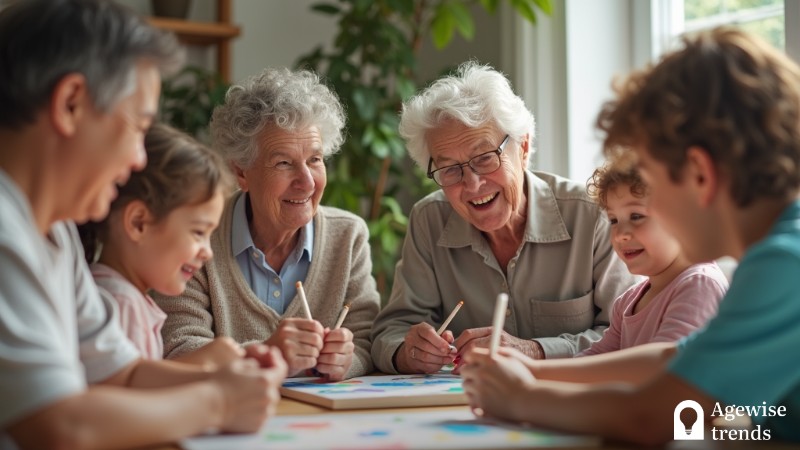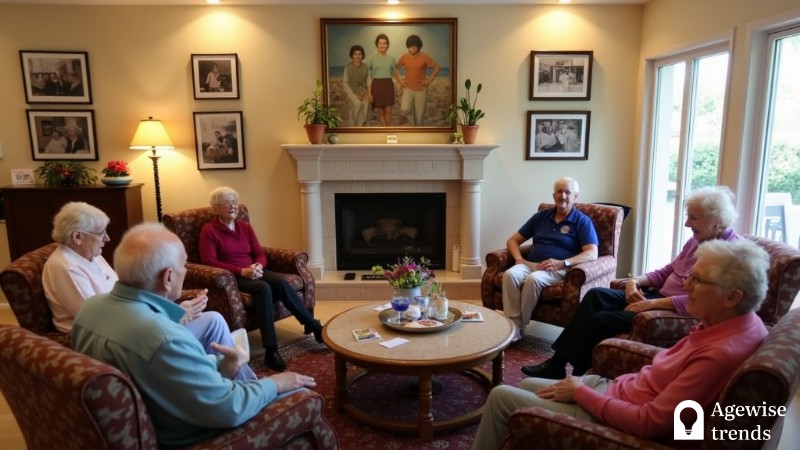Social connections are essential for well-being, yet loneliness and isolation remain widespread issues, particularly among older adults. Intergenerational relationships and structured community programs provide solutions by fostering engagement, promoting social inclusion, and creating opportunities for meaningful connections. Programs such as senior friendship support groups and initiatives focused on enhancing senior social life play a vital role in addressing these challenges.
Key Takeaways
Intergenerational relationships and community programs are effective in reducing isolation among older adults by building social connections and enhancing overall well-being.
- Intergenerational relationships boost happiness, reduce stress, and improve cognitive health for both seniors and younger individuals.
- Senior friendship support groups provide emotional encouragement and opportunities for social engagement to combat loneliness.
- Community initiatives like mentorship programs and volunteer work strengthen intergenerational bonds and enhance senior social life.
The impact of intergenerational relationships
Intergenerational relationships benefit both groups. The Harvard Longitudinal Study found that strong social ties boost happiness, reduce stress, and improve well-being. Seniors share wisdom, while younger individuals offer new perspectives and tech skills.
Psychologist Urie Bronfenbrenner stressed the value of mentorship, noting that every child needs a devoted adult. Similarly, Erik Erikson’s theory of generativity suggests seniors find purpose in guiding younger generations.
Beyond emotional benefits, intergenerational connections also provide cognitive and physical advantages. Seniors who engage socially tend to have lower risks of dementia, heart disease, and depression. Younger individuals, in turn, gain self-confidence, problem-solving skills, and a deeper understanding of the world.
The role of senior friendship support groups
Friendship groups specifically designed for older adults play a crucial role in fostering senior social life. These groups provide a platform for seniors to connect, share experiences, and build lasting relationships. Support groups also help combat loneliness by offering emotional encouragement, companionship, and opportunities for social engagement.
Online platforms help seniors stay connected when mobility is limited, but in-person interactions remain vital for emotional well-being and deeper connections.
Community initiatives combating loneliness
Community programs play a key role in reducing social isolation. In Wisconsin’s Portage County, the Rural Community Connections Task Force (RCCTF), funded by the American Rescue Plan Act, helps older adults and individuals with disabilities by addressing barriers like transportation.
The task force launched its first event at the Food and Farm Exploration Center, attracting over 350 attendees and 38 organizations. These gatherings highlight the importance of community spaces and encourage individuals of all ages to engage in social activities. Families attending these events often include multiple generations, reinforcing the benefits of intergenerational connections.
Addressing the health risks of isolation
Loneliness is more than just an emotional issue—it has serious health implications. Research indicates that social isolation increases the risk of premature mortality by 29%. It is also linked to various health concerns, including heart disease, stroke, diabetes, and depression.
Dana Lawson, a committee member of the RCCTF, stresses that social connection affects human biology and psychology. Isolation influences behaviors such as physical activity, sleep, and nutrition, ultimately impacting overall health outcomes.
By organizing social events, volunteer programs, and senior friendship support groups, community-driven initiatives help seniors stay active, build relationships, and lead healthier lives.
Encouraging more intergenerational engagement
Strengthening intergenerational connections requires effort and commitment. Robert Waldinger, director of the Harvard Longitudinal Study, emphasizes the concept of “social fitness,” which involves actively maintaining relationships rather than waiting for them to develop naturally.
One of the most effective ways to build intergenerational relationships is through mentorship and volunteer work. Older adults can contribute by tutoring, offering career guidance, or participating in community programs, while younger individuals can engage with seniors by assisting with technology, organizing social events, or simply spending time together.
Practical steps to strengthen senior social life
To create meaningful intergenerational relationships and enhance senior social life, individuals and communities can.
Join senior friendship support groups: These groups provide companionship, emotional support, and social activities tailored to older adults.
Participate in local programs: Libraries, senior centers, and community organizations often host events that bring together people of different generations.
Establish mentorship programs: Schools and nonprofits can facilitate opportunities for older adults to share their knowledge and experiences with younger individuals.
Encourage volunteerism: Seniors can gain a sense of purpose by engaging in community service, benefiting both themselves and those in need.
Promote casual social interactions: Simple habits like attending community gatherings, chatting with neighbors, or engaging in group hobbies can lead to lasting friendships.
By fostering stronger intergenerational bonds and supporting senior friendship support initiatives, individuals and organizations can help combat loneliness, improve mental and physical health, and create more connected, resilient communities.















